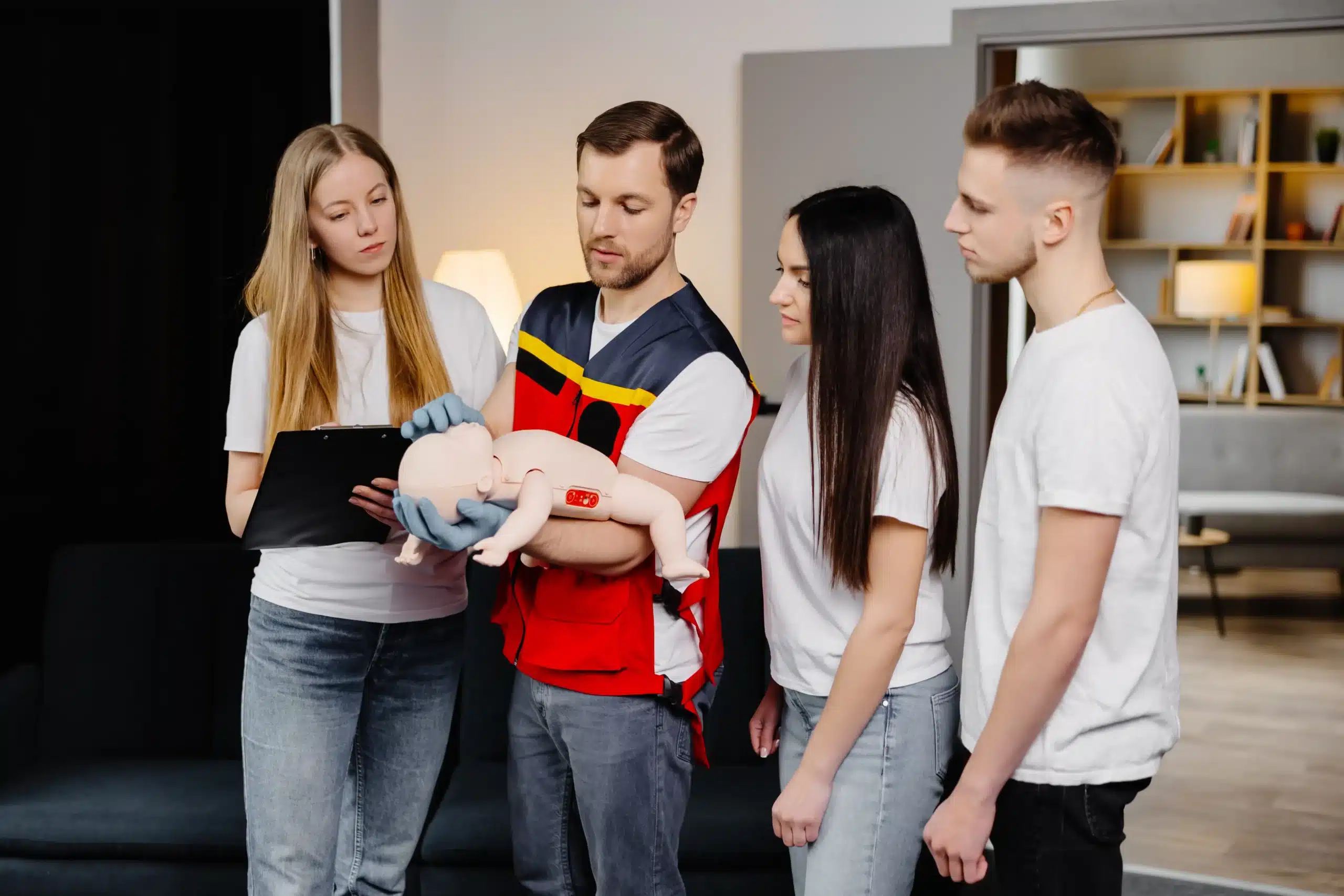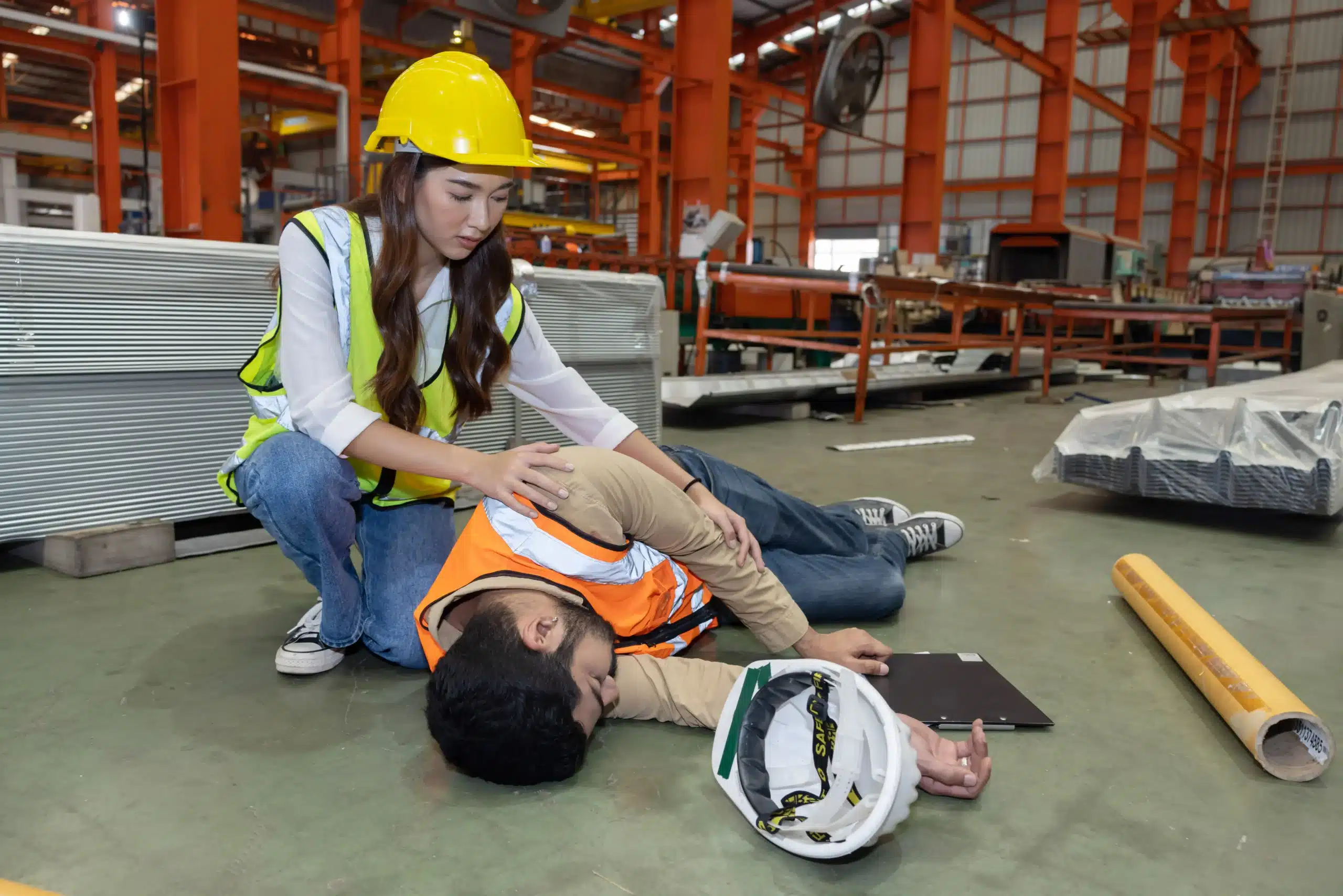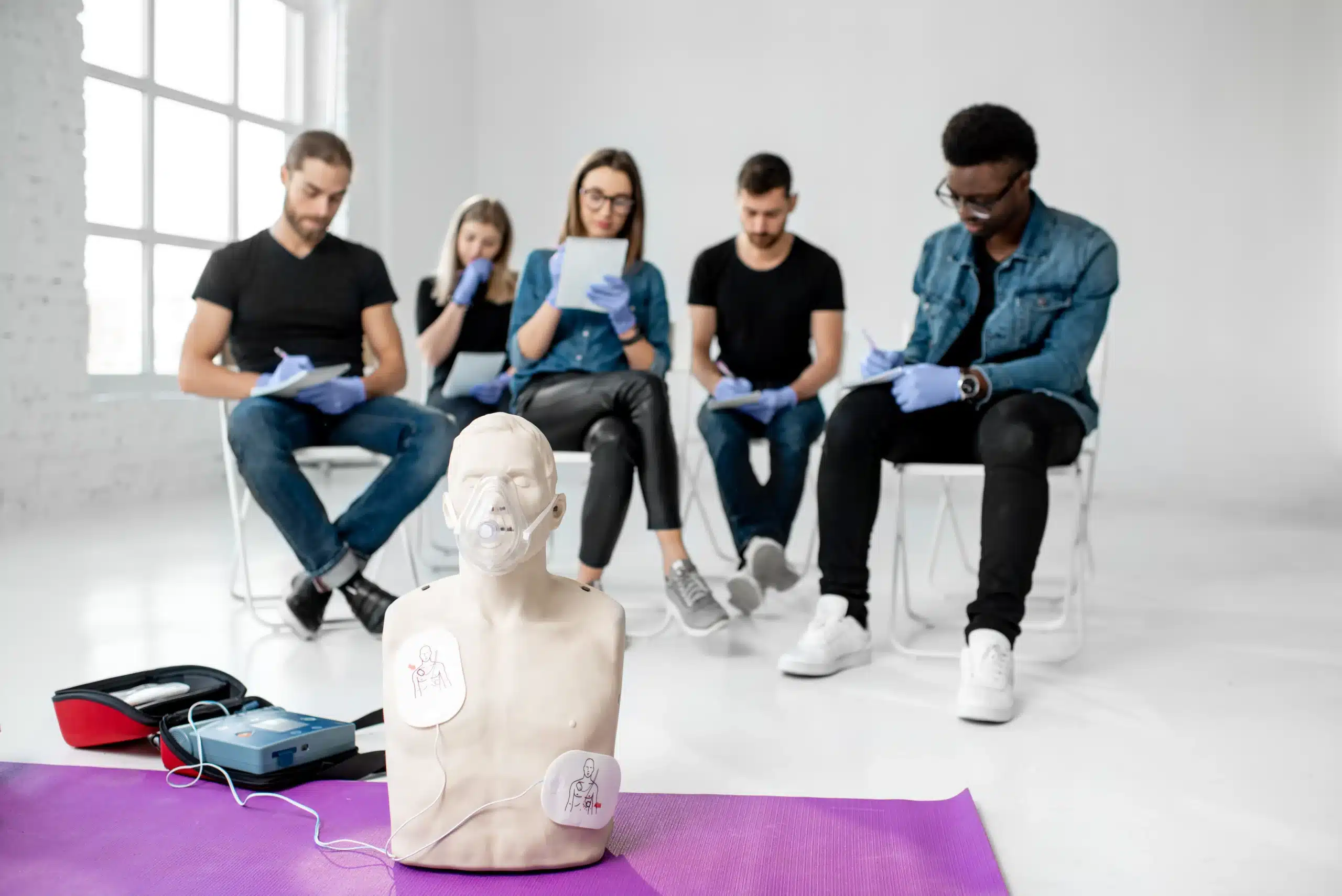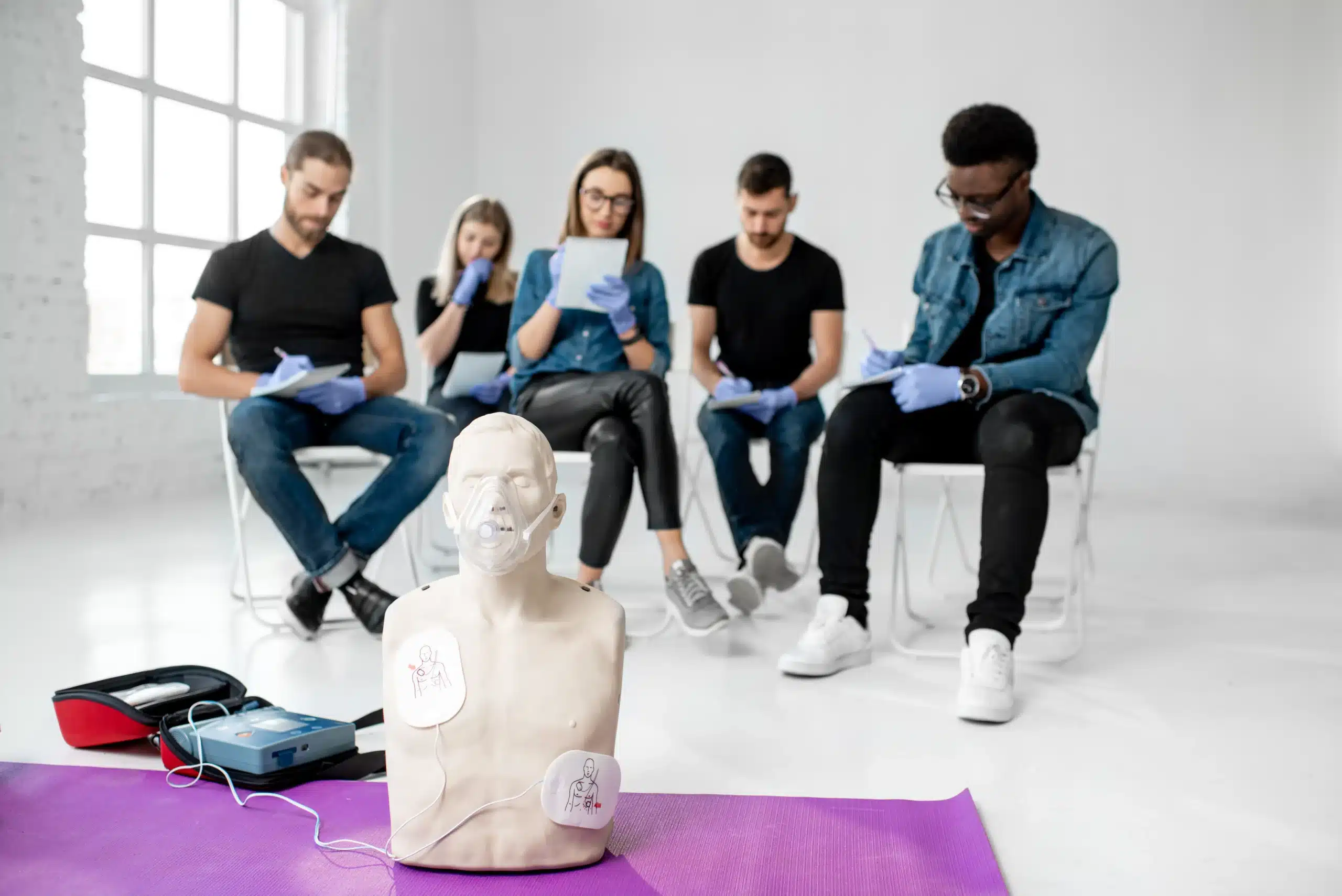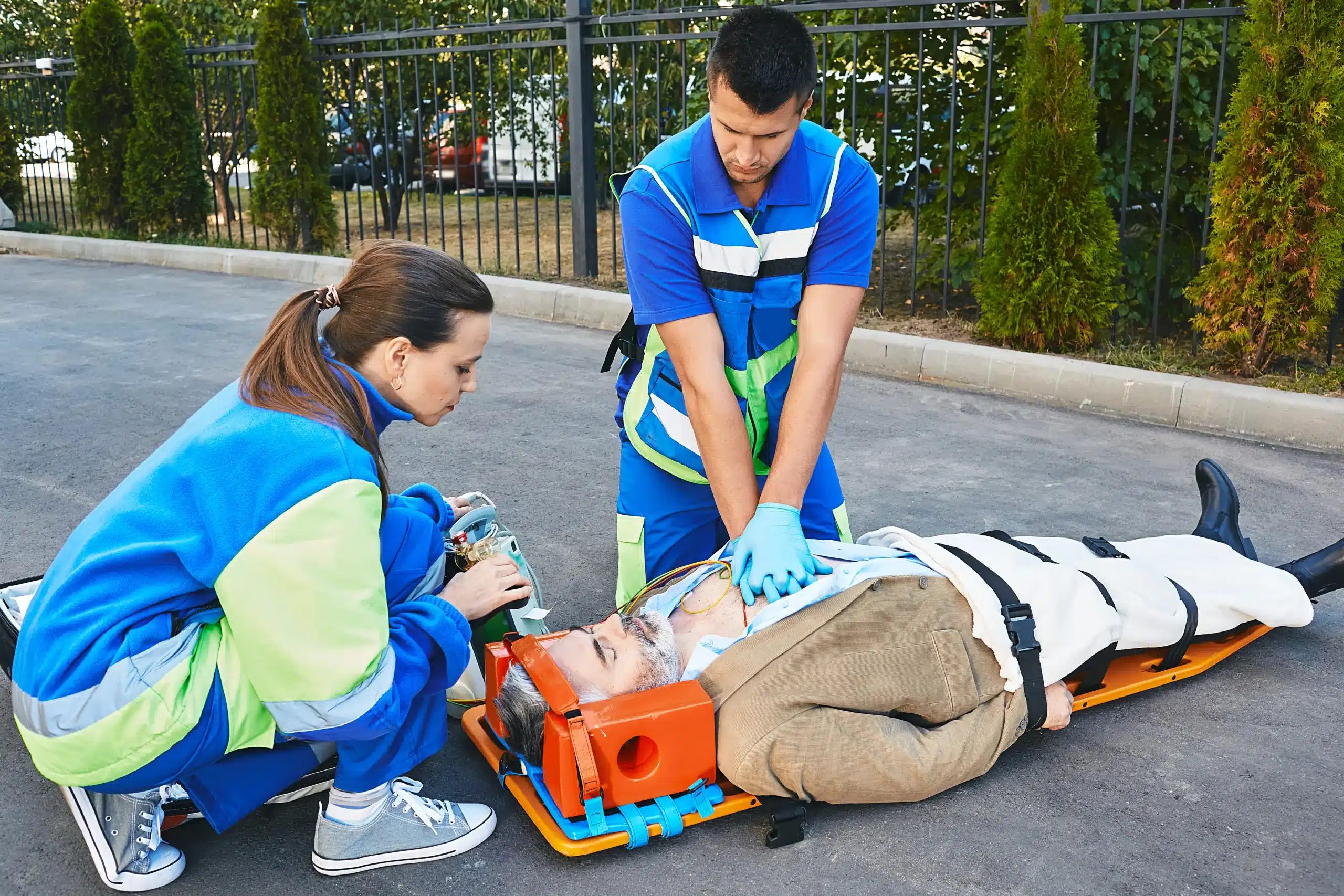Emergencies can happen anytime, anywhere. Being equipped with the skills to respond effectively can make all the difference. This guide explores the world of CPR and first-aid training in Davis, providing valuable insights into available courses, certification options, and the importance of these life-saving skills. We’ll delve into the specifics of CPR and first-aid in Davis, helping you understand the various training programs, local resources, and the steps to becoming certified. Whether you’re seeking professional development or personal preparedness, this guide will equip you with the knowledge to make informed decisions about your training.
Key Takeaways
- CPR and first aid certifications empower you to handle emergencies: These skills equip you to respond effectively to various situations, from everyday mishaps to life-threatening events. Certification validates your training and boosts your confidence.
- Choosing the right course involves several factors: Consider the certifying organization, course format (online, in-person, or hybrid), instructor experience, and cost when selecting a program. Explore local resources and compare providers to find the best fit.
- Maintaining your certification is essential: CPR and first aid certifications typically expire after two years. Regularly refresh your skills and knowledge to stay prepared and ensure you can act quickly and confidently in an emergency.
What are CPR and First Aid?
CPR and first aid training gives you the skills to respond to emergencies. From a child choking on a grape to a more serious cardiac event, these skills can make all the difference. But what exactly do these skills entail, and why is getting certified so important?
What do CPR and First Aid involve?
CPR, or Cardiopulmonary Resuscitation, focuses on restoring breathing and circulation. You’ll learn chest compressions and rescue breaths—techniques designed to keep oxygenated blood flowing to the brain and other vital organs until professional help arrives. CPR classes teach these essential skills. First aid covers a broader range of situations, from treating minor cuts and burns to managing seizures and allergic reactions. Think of it as your toolkit for handling everything from everyday mishaps to more critical incidents. These courses also cover how to use an AED, control bleeding, and respond to various medical emergencies.
Why is certification important?
Holding a CPR and first aid certification shows you’ve received proper training and met specific standards. It’s often a job requirement, especially in healthcare, education, and childcare. Many employers also prefer certified individuals for other roles, recognizing the value of these skills in any workplace. Certification demonstrates your preparedness and can boost your confidence in handling emergencies. AHA certification, in particular, is widely recognized and respected.
Local requirements and regulations
While specific requirements vary by profession, understanding local resources and regulations is helpful. In Davis, the UC Davis Fire Department offers CPR and first aid certification classes to students, staff, and the public. They even partner with Campus Recreation to provide free courses for UC Davis students. For a comprehensive guide to CPR certification in Davis, including local resources and regulations, check out this helpful blog post. Knowing what’s available locally makes finding the right training easier.
Find CPR and First Aid Courses in Davis
Finding the right CPR and First Aid course can feel overwhelming with so many options. This section breaks down the different types of courses and providers available in Davis, helping you make an informed decision.
American Heart Association (AHA) Courses
Davis CPR Classes offers a comprehensive selection of American Heart Association (AHA) courses. These range from basic life support (BLS) to advanced cardiovascular life support (ACLS) and pediatric advanced life support (PALS). AHA certification is widely recognized and often a requirement for healthcare professionals. You can find their course schedule and register directly through the Davis CPR Classes website.
Red Cross Offerings
While Davis CPR Classes focuses on AHA certifications, other providers like In Home CPR offer Red Cross training. This can be a suitable option if you prefer the Red Cross curriculum or the convenience of in-home training.
Specialized Courses for Healthcare Professionals
For medical professionals seeking specialized training, Davis CPR Classes also provides courses like the Resuscitation Quality Improvement (RQI) program. RQI offers a flexible, performance-based approach to maintaining CPR skills, which is particularly valuable for busy healthcare providers. For other options, check out Safety Training Seminars, which offers various AHA courses designed specifically for healthcare professionals.
Options for the General Public and Specific Industries
Beyond healthcare providers, CPR and First Aid training is beneficial for everyone. Davis CPR Classes offers courses tailored to the general public, including CPR and First Aid certification, designed for various needs and experience levels. Whether you’re a parent, teacher, coach, or simply want to be prepared for emergencies, you can find a suitable course in Davis.
Compare Course Providers, Pricing, and Formats
Finding the right CPR and First Aid certification course means comparing a few key things. Let’s look at some training providers, costs, and course structures in Davis.
Davis CPR Classes
Davis CPR Classes offers a variety of American Heart Association (AHA) courses, including BLS, ACLS, PALS, and First Aid. They prioritize flexible options and have a low-price guarantee. Visit their website for current course schedules and pricing.
UC Davis Fire Department
The UC Davis Fire Department offers free CPR and First Aid training to current UC Davis students through a partnership with Campus Recreation. This is a fantastic option for students looking for certification without the cost. More information is available on the Fire Department’s website.
Safety Training Seminars
Safety Training Seminars, a woman-owned AHA Training Center, provides CPR, BLS, ACLS, PALS, and First Aid training in Davis. They focus on high-quality instruction and convenient scheduling. Find their course catalog and registration information on the Davis CPR Classes website.
The CPR Hero Training Center
The CPR Hero Training Center also offers CPR classes in Davis. They emphasize their instructors’ experience and commitment to serving the community. Visit their website to learn more about their courses.
Cost Range and Available Discounts
CPR and First Aid course costs in Davis vary. Prices depend on factors like the certifying organization (AHA or Red Cross), the certification level (CPR, BLS, ACLS, etc.), and the course format. Many providers offer discounts, so check individual websites for current pricing and any deals. Davis CPR Classes offers a low price guarantee.
Free Options for Students and Community Members
UC Davis students can get free CPR and First Aid training through the UC Davis Fire Department. Sometimes, community organizations or healthcare providers offer free or low-cost CPR training. Look for these opportunities through local announcements and community centers.
In-Person, Online, and Hybrid Course Formats
Many course providers offer different learning formats. In-person classes provide hands-on practice and interaction with instructors. Online courses offer flexibility. Hybrid courses combine online learning with in-person skills sessions. Davis CPR Classes offers a range of formats. You can find their BLS courses for Davis on their website.
Time Commitment for Different Certification Levels
The time required for CPR and First Aid certification depends on the course level. Basic CPR courses can often be completed in a few hours, while advanced certifications (BLS, ACLS, or PALS) take longer. Check with your chosen provider for specific course durations. For instance, the UC Davis Fire Department lists their Heartsaver CPR/AED & First Aid course as a six-hour commitment.
Evaluate Instructor Qualifications and Course Quality
Finding the right CPR and first-aid class involves more than just picking a convenient time and location. You also want to ensure you’re learning effective, up-to-date techniques from qualified instructors. Here’s what to consider:
AHA Certification Requirements
The American Heart Association (AHA) sets the standard for CPR and first-aid training. Look for courses that follow AHA guidelines to ensure you’re receiving high-quality instruction based on the latest science. Davis CPR Classes offers a variety of AHA-compliant courses, covering everything from basic life support (BLS) for healthcare providers to more advanced certifications like ACLS and PALS. This ensures you receive training recognized and respected by healthcare professionals and employers.
Experience in Emergency Response
Consider the instructors’ backgrounds. Learning from professionals with real-world experience adds a valuable layer to your training. Instructors who are also EMTs or paramedics, for example, can share insights from their own experiences, giving you a deeper understanding of how these skills apply in real emergencies. Davis CPR Classes brings this expertise directly to you, offering classes taught by experienced professionals at your home or office.
Hands-on Training Expertise
Effective CPR and first-aid training goes beyond textbooks and lectures. Look for courses that emphasize hands-on learning. Practical experience is essential for building muscle memory and confidence. Opportunities to practice skills like chest compressions, rescue breaths, and bandaging techniques on manikins and other simulation equipment will solidify your learning and prepare you to act quickly and effectively in a real emergency.
Real-World Skill Application
The best CPR and first-aid courses bridge the gap between the classroom and real-life scenarios. Practicing with training equipment under the guidance of experienced instructors allows you to apply your skills in a simulated environment. This hands-on training builds confidence and competence, ensuring you’re not just memorizing steps but truly understanding how to respond in a crisis. This practical application is invaluable in preparing you for the unexpected.
Discover the Benefits of CPR and First Aid Certification
Getting certified in CPR and first aid isn’t just about checking a box; it’s about equipping yourself with skills that can make a real difference. These certifications offer a range of personal, professional, and community benefits that extend far beyond the classroom.
Develop Personal Skills
CPR and first aid training empowers you to handle emergencies with confidence. You’ll gain essential skills and knowledge, allowing you to respond effectively under pressure. This newfound ability can boost your self-esteem and provide peace of mind knowing you can act when it matters most. The UC Davis Fire Department offers CPR classes to help individuals develop these essential skills.
Advance Your Career
In many industries, CPR and first aid certifications are highly sought after. Holding these certifications demonstrates your commitment to safety and your ability to handle critical situations, giving you a competitive edge. Davis CPR Classes highlights how AHA certifications can be valuable for career advancement. For affordable options, check out their low price guarantee.
Enhance Community Safety
By becoming certified, you contribute to a safer community. You’ll be prepared to assist anyone in need, from family and friends to coworkers or even strangers. CPR and first aid training programs offer various courses to meet different needs, ensuring everyone has access to these vital skills. The UC Davis Fire Department offers various CPR classes and certifications to meet diverse community needs.
Respond Immediately in Emergencies
CPR and first aid courses provide hands-on training using manikins and simulation equipment. This practical experience, guided by instructors, prepares you to respond swiftly and effectively in real-life emergencies. Davis CPR Classes offers this type of hands-on training. You can find their BLS courses scheduled for Davis on their website. They also offer other important health and safety training, including courses on lead poisoning prevention.
Increase Survival Rates in Cardiac Arrests
Studies show that early CPR significantly increases the chances of survival for someone experiencing cardiac arrest. Your quick actions can quite literally save a life. Learn more about the importance of CPR training from the UC Davis Fire Department.
Get Certified: Steps and Expectations
Getting your CPR and first-aid certification is straightforward. Here’s a step-by-step guide:
Choose the right course
Davis CPR Classes offers a range of AHA-compliant courses, from basic CPR to advanced certifications like ACLS and PALS. Consider your current skills and any job requirements when making your decision. If you’re unsure which course suits you, reach out to a training provider like Davis CPR Classes for guidance. They can help you understand the different certification levels and recommend the best fit.
Register for a course
Once you’ve chosen your course, register. Course lengths and delivery methods vary depending on the provider and the type of certification. Davis CPR Classes offers various schedules and formats, including online, in-person, and blended learning. Understanding these options helps you choose what works best for your schedule and learning style. Check the provider’s website or contact them to find upcoming course dates and register.
Prepare for your course
Most courses require some pre-course preparation. This might involve completing online modules, reading the student handbook, or familiarizing yourself with basic first-aid procedures. For example, the CPR and First Aid online course through Davis CPR Classes involves about two hours of online work before a shorter in-person skills test. Adequate preparation ensures you maximize your in-person training.
Renew your certification
CPR certifications typically expire after two years. Staying current with your certification is crucial for maintaining your skills and ensuring you’re prepared to respond effectively in an emergency. Set reminders for your renewal date and check with your certifying organization, such as the American Heart Association, for renewal guidelines. Many providers offer refresher courses.
Apply skills in real-life situations
While certification provides a solid foundation, real-life emergencies can be unpredictable. Regularly reviewing your training materials and practicing your skills helps you stay sharp and confident. Consider participating in mock drills or scenarios to reinforce your learning and improve your response time. Your training empowers you to make a difference.
Related Articles
- Importance of Workplace CPR & First-Aid Training
- Essential Role of CPR in Healthcare: A Lifesaving Skill
- CPR Certification in Davis: Your Complete Guide – Davis CPR Classes
- First Aid Classes in Sacramento: A Complete Guide – Davis CPR Classes
- CPR Training in Sacramento: Comprehensive Guide
Frequently Asked Questions
What’s the difference between CPR and First Aid?
CPR focuses specifically on restoring breathing and circulation through chest compressions and rescue breaths. First Aid encompasses a wider range of skills, from treating minor injuries like cuts and burns to managing more serious situations like seizures or allergic reactions. Both are valuable skills to have in any emergency.
How do I choose the right CPR and First Aid course?
Think about your specific needs. Are you getting certified for a job, or do you want the skills for personal preparedness? Consider the certification type (AHA or Red Cross), the course format (online, in-person, or blended), and the instructor’s experience. If you’re in the Davis area, Davis CPR Classes offers various options and can help you find the right fit.
Why is AHA certification important?
The American Heart Association (AHA) is a highly respected organization that sets the standard for CPR and First Aid training. AHA certification is widely recognized and often preferred by employers, especially in healthcare. It signifies you’ve received high-quality training based on the latest research and guidelines.
How much do CPR and First Aid courses cost?
Costs vary depending on the provider, the type of certification, and the course format. Expect to pay more for advanced certifications like BLS, ACLS, or PALS compared to basic CPR and First Aid. Look for providers offering discounts or low-price guarantees, like Davis CPR Classes. Also, check if free or discounted options are available through community organizations or for specific groups like students.
How long does CPR certification last, and how do I renew it?
Most CPR certifications are valid for two years. To renew, you’ll need to take a refresher course. Check with your certifying organization (AHA or Red Cross) for specific renewal requirements. Many training providers offer renewal courses, making it easy to stay up-to-date.



